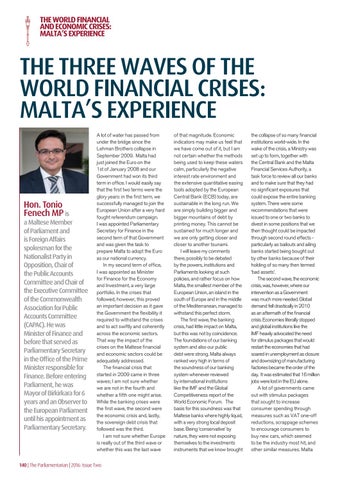THE WORLD FINANCIAL AND ECONOMIC CRISES: MALTA’S EXPERIENCE
THE THREE WAVES OF THE WORLD FINANCIAL CRISES: MALTA’S EXPERIENCE
Hon. Tonio Fenech MP is
a Maltese Member of Parliament and is Foreign Affairs spokesman for the Nationalist Party in Opposition, Chair of the Public Accounts Committee and Chair of the Executive Committee of the Commonwealth Association for Public Accounts Committee (CAPAC). He was Minister of Finance and before that served as Parliamentary Secretary in the Office of the Prime Minister responsible for Finance. Before entering Parliament, he was Mayor of Birkirkara for 6 years and an Observer to the European Parliament until his appointment as Parliamentary Secretary.
A lot of water has passed from under the bridge since the Lehman Brothers collapse in September 2009. Malta had just joined the Euro on the 1st of January 2008 and our Government had won its third term in office. I would easily say that the first two terms were the glory years: in the first term, we successfully managed to join the European Union after a very hard fought referendum campaign. I was appointed Parliamentary Secretary for Finance in the second term of that Government and was given the task to prepare Malta to adopt the Euro as our national currency. In my second term of office, I was appointed as Minister for Finance for the Economy and Investment, a very large portfolio. In the crises that followed, however, this proved an important decision as it gave the Government the flexibility it required to withstand the crises and to act swiftly and coherently across the economic sectors. That way the impact of the crises on the Maltese financial and economic sectors could be adequately addressed. The financial crisis that started in 2009 came in three waves; I am not sure whether we are not in the fourth and whether a fifth one might arise. While the banking crises were the first wave, the second were the economic crisis and, lastly, the sovereign debt crisis that followed was the third. I am not sure whether Europe is really out of the third wave or whether this was the last wave
140 | The Parliamentarian | 2016: Issue Two
of that magnitude. Economic indicators may make us feel that we have come out of it, but I am not certain whether the methods being used to keep these waters calm, particularly the negative interest rate environment and the extensive quantitative easing tools adopted by the European Central Bank (ECB) today, are sustainable in the long run. We are simply building bigger and bigger mountains of debt by printing money. This cannot be sustained for much longer and we are only getting closer and closer to another tsunami. I will leave my comments there, possibly to be debated by the powers, institutions and Parliaments looking at such policies, and rather focus on how Malta, the smallest member of the European Union, an island in the south of Europe and in the middle of the Mediterranean, managed to withstand this perfect storm. The first wave, the banking crisis, had little impact on Malta, but this was not by coincidence. The foundations of our banking system and also our public debt were strong. Malta always ranked very high in terms of the soundness of our banking system whenever reviewed by international institutions like the IMF and the Global Competitiveness report of the World Economic Forum. The basis for this soundness was that Maltese banks where highly liquid, with a very strong local deposit base. Being ‘conservative’ by nature, they were not exposing themselves to the investments instruments that we know brought
the collapse of so many financial institutions world-wide. In the wake of the crisis, a Ministry was set up to form, together with the Central Bank and the Malta Financial Services Authority, a task force to review all our banks and to make sure that they had no significant exposures that could expose the entire banking system. There were some recommendations that were issued to one or two banks to divest in some positions that we then thought could be impacted through second round effects particularly as bailouts and ailing banks started being bought out by other banks because of their holding of so many then termed ‘bad assets’. The second wave, the economic crisis, was, however, where our intervention as a Government was much more needed. Global demand fell drastically in 2010 as an aftermath of the financial crisis. Economies literally stopped and global institutions like the IMF heavily advocated the need for stimulus packages that would restart the economies that had soared in unemployment as closure and downsizing of manufacturing factories became the order of the day. It was estimated that 16 million jobs were lost in the EU alone. A lot of governments came out with stimulus packages that sought to increase consumer spending through measures such as VAT one-off reductions, scrappage schemes to encourage consumers to buy new cars, which seemed to be the industry most hit, and other similar measures. Malta
